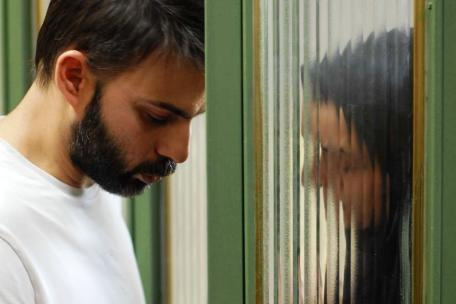Farhadi and the Golden Globe: An ovation

The jubilation and glory brought to Iranians on late Sunday is perhaps indebted more than anything else to a benign apology: in mid-September of 2010, in his trophy speech after receiving the Iranian House of Cinema’s award for best movie direction, Asghar Farhadi expressed his hope for a day when dissident artists, including actress Golshifteh Farahani and director Jafar Panahi would find a chance to continue their careers inside Iran. If it wasn’t for his lukewarm correction of his remarks and placing the blame on a politically-motivated misreading of them, the ban on production of the then-filming Nader and Simin: A separation would not be lifted, and Farhadi, whose last movie was dubbed “anti-Iranian” by a hard-liner weekly, wound never have had the opportunity to describe his compatriots as “very peace-loving,” on a stage in Beverly Hills.
From his first artistic product, the popular TV series “The Tale of a City”, Farhadi placed social matters at the forefront of his concerns. In a progressive career trajectory, at its top a trilogy that set off with Fireworks Wednesday, continued with About Elly and culminated in A Separation, Asghar Farhadi has devoted special attention to class differences in Tehran, and is unquestionably a virtuoso in picturing the difference in norms and values of the lower- and middle-class of Iran’s bustling capital. (Note how in Fireworks Wednesday, Mozhdeh, the estranged middle-class wife, warns Roohi, her young cleaner, not to ask for her husband’s permission to pluck her eyebrows and the young bride’s combined surprise and joy; or note in what is perhaps the quintessential scene of A Separation, Hojjat, the unemployed, indebted-to-the-neck shoemaker, who snaps at the judge that the likes of him cannot talk nicely like Nader, the stubborn bank clerk and his people.)
Drilling deep inside their psyche, Farhadi indirectly depicts how the Iranian middle-class --despite its purported Westernized lifestyle— still tends to follow traditions in critical moments: when it comes to gender relations, in Fireworks Wednesday, Morteza , owner of a small-scale graphic design company, beats his wife in the street in front of other people -after seeing from his office’s window how a cruising car suggestively stops in front of her; in About Elly, Amir also beats his wife Sepideh when he discovers how her innocuous lies have plunged their on-holiday crew in the most twisted situation.
As to religion: in A Separation, despite no outward display of religion in Nader and Simin’s life, in the final, consequential chapter of the movie, Nader asks Razieh, their deeply religious maid, to swear to the holy book that he had caused her miscarriage. In About Elly, Ali-Reza, the distressed fiancé, asks his hosts to bring him a Quran and a prayer rug, to take solace after knowing the truth about Elly.
Following the disturbing 2009 presidential election which ushered in hyper-politicized days when nondescript semiosis were impregnated with political interpretations, A Separation turned into an antithesis to The Deportees III, a comedy movie sarcastically narrating the saga of the 2009 presidential elections and directed by vigilante-turned-director Massoud Dehnamaki (who enjoyed loosely veiled support from the government and well-known Principlist figures.) For the disillusioned Green Movement, boosting A Separation’s box office vis-à-vis The Deportees could be another way to prove that they were the real majority, the ones who preferred Mir-Hossein Mousavi, a painter, as their president, not to Mahmoud Ahmadinejad, the engineer.
The aggravating polarization eventually intensified ideology-driven criticisms leveled at Farhadi’s film by the conservative media. His movie was claimed to be custom-made for Western taste –assumed to prefer a gloomy picture of Iran, where poverty is rampant and vice has permeated daily life. Even Ebrahim Hatamikia, whose popularity spans across all walks of Iranian movie lovers, criticized A Separation, saying that it brings despair to the audience. “An act of extreme immorality,” in his own words. “He is wiser to have uttered such words with honesty,” responded Farhadi, whose movies have been known as treatises in criticism of judging.
By: Ali Attaran


